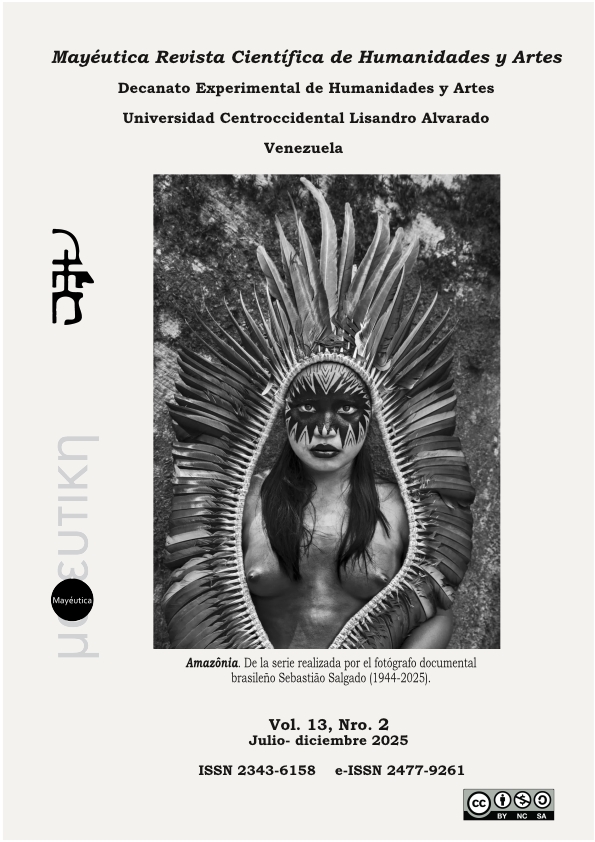Female selfleadership and gestalt intelligence
Case study of a group of resilient Venezuelan migrant women in North and Central America
DOI:
https://doi.org/10.5281/zenodo.16505187Keywords:
Venezuelan migrant women, gestalt intelligence, self leadership, equity, ageism.Abstract
We present the results of a research whose objective is: to carry out a phenomenological hermeneutic study of female selfleadership, seen from the empowerment of seven Venezuelan migrant women living in the United States, Mexico and Costa Rica, born in the 20th century between the 1930s and the 1990s. Regarding the hermeneutic horizon, these women exercise selfleadership from the use of gestalt intelligence in challenging sociohistorical contexts.In the methodological approach, the triangulation of methods was used to adapt to the specificities of the versions of the interviewees as units of analysis to achieve an understanding of the action of human life from the experience of these migrants.It is concluded that the way emotions are managed makes a difference in the resilience and empowerment of these women without ageism.
Downloads
References
Bartra R. (2011). Antropología del cerebro: determinismo y libre albedrío. Salud Mental. Conferencia magistral dictada en la XXV Reunión Anual de Investigación del Instituto Nacional de Psiquiatría Ramón de la Fuente, 6 de octubre de 2010.
Bear, M., Connors, B. y Paradaiso M. (2008). Neurociencia. Explorando el cerebro. Masson Williams & Wilkins.
Beaty R., Benedek, M., Silvia. J., & Schacter D. (2016). Creative cognition and brain network dynamics. Trends Cogn. Sci, 20, 87–95.https://doi.org/10.1016/j.tics.2015.10.004
Bickart, K., Dickerson, B. & Feldman, L. (2014). The amygdala as a hub in brain networks that support social life. Neuropsychologia, 63, 235248. DOI: https://doi.org/10.1016/j.neuropsychologia.2014.08.013
Capra, F. (1996). El punto crucial. Ciencia, sociedad y cultura naciente. Estaciones.
Carvajal, B., Marín González, F. y Ibarra Morales, L. (2023). Triangulación de métodos en ciencias sociales como fundamento en la investigación universitaria en Latinoamérica. Mayéutica Revista Científica de Humanidades y Artes, 11(2), 43-58.https://doi.org/10.5281/zenodo.8140907
Carvajal, B., (2021). Inteligencia gestáltica y creatividad, Implicaciones neurocientíficas y epistemológicas en el quehacer investigativo en ciencias sociales.KindleDirectPublishing.https://www.amazon.com/Inteligenciagest%C3%
A1lticacreatividadneurocient%C3%ADficasepistemol%C3%B3gicas/dp/B09MYRCZ8Tdesafíos
Carvajal, B. (2019). Neuromanager e Inteligencia Gestáltica: Herramientas para enfrentar organizacionales. Académica española.www.amazon.com//es/BeatrizCarolinaCarvajal/dp/6200036306
Castanedo, C. (1997). Terapia Gestalt, Enfoque centrado en el aquí y ahora. Herder.
Díaz, P. (2008) Implicancias de las técnicas de medición de la actividad cerebral en la cognición: ¿El tiempo o el espacio? Revista de Psicología, XVII (1), 87-100. https://doi.org/10.5354/07190581.2008.17143
Gadamer, H. (1998). El giro hermenéutico. Cátedra.
Gardner, H. (2010). La Inteligencia Reformulada. Paidós Ibérica.
Goleman, D. (2016). El cerebro y la inteligencia emocional: nuevos descubrimientos.Zeta Bolsillo.
Honoré, C. (2019). Elogio de la Experiencia. Cómo sacar partido de nuestras vidas más longevas. RBA.
Lévinas, E. (1973). The Theory of Intuition in Husserl's Phenomenology.Northwestern University Press.
Martínez, M. (2009). Nuevos Paradigmas en la Investigación. Alfa.
Martínez, M. (2004). Ciencia y arte en la metodología cualitativa. Trillas.
Maturana, H. (1997). La objetividad. Un argumento para obligar. Dolmen Ediciones.
MerleauPonty, M. (2002). Phenomenology of perception. (C. Smith, Trans.). Routledge. (Original work published 1945).
MerleauPonty, M. (2004). The world of perception. (O. Davis, Trans.) Routledge. (Original work published 1948).
Moreno, A. et al. (2002). Buscando padre. História de vida de Pedro Luna. Universidad de Carabobo y Centro de Investigaciones Populares.
Naciones Unidas. (2018). La Agenda 2030 y los Objetivos de Desarrollo Sostenible: una oportunidad para América Latina y el Caribe. (LC/G.2681P/Rev.3)
Naciones UnidasMigración.(2022).World Migration Report 2022. https:// publications.iom.int/es
Naciones UnidasMigración.(2023). World Migration Report 2023. https:// publications.iom.int/es
Nalebuff, B. & Brandenburger A. (2005). Coopetencia. Traducido por Jorge Cárdenas Nannetti. Norma. (Obra original publicada 1996).
Orange, D. (2014). Thinking for CliniCians. Philosophical Resources for Contemporary Psychoanalysis Routledge.
Perls, F. (1975). Yo, hambre y agresión. Fondo de Cultura Económica.
Perls, F. (1997a). El enfoque gestáltico y testimonios de terapia. Cuatro Vientos.
Perls, F. (1977b). Dentro y fuera del tarro de la basura. Cuatro vientos.
Perls, F. y Baumgardner P. (2006). Terapia Gestalt. Teoría, práctica y su aplicación. Pax.
Pessoa, L. (2014). Understanding brain networks and brain organization. Phys Life Rev. 11(3), 400–435. Doi: 10.1016/j.plrev.2014.03.005
Purves, D., Augustine, G., Fitzpatrick, D., Katz, L., Lamantia, A., & Mc Namara; J.(2015). Invitación a la neurociencia. Medica Panamericana.
Ricoeur, P. (2017). Hermenéutica. Escritos y conferencias 2. Trotta.
Statista. (2024). Evolución anual de la tasa de inflación en Venezuela desde 2015 hasta 2026. https://es.statista.com/estadisticas/1190213/tasadeinflacionvenezuela/
Valerie J. (2001). Intuition and Creativity: A Pas de Deux for Qualitative Researchers. Qualitative Inquiry, 7,5 .https://doi.org/10.1177/107780040100700501
Vieira, E. (2022). A Doutrina do Mel, a condição comunicacional e a verdade: Sobre a requalificação clínica da capacidade de julgar. Modernos & Contemporâneos International Journal of Philosophy, 6 (15), 51-68. https://ojs.ifch.unicamp.br/ index.php/modernoscontemporaneos/article/view/4836
Vieira, E. (2015). Management theory and the psychopolitical emancipation of the subject of continuous selfcontrol and annual balances. Ágora De Heterodoxias, 1(2), 3453. https://revistas.uclave.org/index.php/agora/article/view/257
Vieira, E. (2012). Epistemologías Prehispánicas de América Latina y Cambio Psico Social: el caso de los conceptos derechos a la comunicación y desarrollo mediático. Folios revista de la Facultad de Comunicaciones y Filología, 24, 121-140. https:// revistas.udea.edu.co/index.php/folios/article/view/11657
Vieira, E. (2009). Território Mental, o nó górdio da democracia. Democracia Viva. 42, 76-81.
von Bertalanffy, L. (1989). Teoría general de los sistemas. Fundamentos, desarrollo, aplicaciones. Fondo de Cultura Económica.
Published
How to Cite
Issue
Section

This work is licensed under a Creative Commons Attribution-NonCommercial-ShareAlike 4.0 International License.





